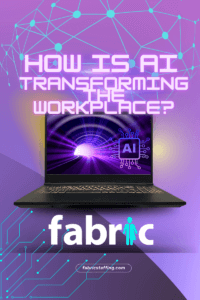

Helping talent fully reach their professional potential is a goal every organization aspires to but doesn’t always quite achieve.
However, the rise in technological advancements, combined with a renewed focus on personal growth and company purpose, is paving the way to further unlocking this potential.
At the heart of these advancements is Artificial Intelligence (AI), which is revolutionizing the way we work, learn, and grow within our professional environments.
AI’s Role in Enhancing Productivity
AI is poised to have a transformational impact on the world of work over the next decade and beyond. Its effects on productivity, quality of work, and the nature of tasks are already being felt across all industries.
While there are concerns about AI’s impact on jobs, history shows that technological revolutions ultimately lead to higher employment, not less. The key lies in how employers deploy these tools to maximize opportunities.
In the talent business, AI is making a significant impact.
Many organizations are investing heavily in innovative tools to enhance workforce management. These tools make the job search process more inclusive, transparent, and personalized for candidates.
AI-powered search and match technologies, for instance, have become some of the most utilized recruitment tools. According to Randstad Enterprise’s 2024 Talent Trends research, two-thirds of employers in 21 markets are using these tools to better hire the right candidates for job vacancies. Moreover, talent themselves view AI positively, with most (52%) believing it will lead to career growth and promotion.
Organizations that are utilizing new AI tools in their hiring process have recorded reduced hiring times significantly. AI has helped them in finding overlooked talent whose innate skills and adaptability make them better fits for roles.
This shift allows recruiters to spend more time on personal interactions, engaging and nurturing talent, and building key long-term relationships. Such transformations are not just exciting developments but also opportunities to ensure AI tools are used without bias.
The integration of hiring with learning and development (L&D) is happening rapidly at the corporate level.
Talent Trends research shows that an overwhelming majority (82%) of employers expect recruiters to collaborate more with L&D counterparts in the future. Nearly two-thirds (65%) say their organization is increasing investments in skilling. L&D is a priority for many HR leaders, with half planning to focus more resources on it in 2024.
This personalized approach to skilling means hiring people based on not just education and experience but also innate competencies and potential. Such a strategy results in a more diverse workforce and requires employers to provide tailored skilling support.
AI plays a crucial role here by identifying skill gaps and designing suitable training programs, helping employees prepare for future demands.
Cultivating a People-First Approach
While providing the right tools and skills is essential, motivating and nurturing a workplace culture that fosters creativity and ambition is equally important.
Since our inception in 2016 we’ve noticed a growing trend of efforts and care by employers to motivate their workforce through monetary and non-monetary measures like work-life balance, flexible work arrangements, and wellness support. Companies are also emphasizing purpose, value, and equity in the workplace to drive engagement and ownership.
According to Workmonitor research, employees value soft benefits highly, which significantly impact their attitude toward work. For instance, a majority of Gen Z workers prioritize career progression, while many Millennials value workforce diversity.
Furthermore, flexible work arrangements, such as working from home at least one day a week, are non-negotiable for many employees.
As such, it’s no surprise that culture, skilling, and flexible schedules are top priorities for many employers. Talent Trends research indicates that the top three employee issues employers are focusing on are L&D, company values, and work arrangement policies.
Additionally, a quarter of employers want to invest more in articulating their company values and value proposition for employees, while 22% aim to shift towards a culture prioritizing personal well-being.
The Strategic Application of Talent Intelligence
Strategic application of talent intelligence is crucial for organizations aiming to stay ahead in recruiting.
Talent intelligence involves the systematic collection, analysis, and application of data related to the external talent market. This includes insights into competitors’ talent pools, industry trends, and geographical talent distribution. By leveraging this data, organizations can:
- Identify market trends and adjust talent strategies accordingly.
- Understand competitor talent strategies and attract top talent.
- Optimize location strategies by identifying talent hotspots.
- Build robust executive pipelines by mapping potential candidates and nurturing relationships over time.
Advanced tools and platforms, such as LinkedIn Talent Insights, TalentNeuron, and geospatial analysis tools, help process and analyze large datasets, making talent intelligence actionable.
Collaboration across various departments, building a data-driven culture, and continuous learning and adaptation are essential for the successful implementation of talent intelligence.
Conclusion
AI is undeniably transforming the workforce, enhancing productivity, personalizing skilling, and fostering a people-centered approach to work.
By effectively leveraging AI and talent intelligence, organizations can not only improve their talent acquisition strategies but also align their workforce with future business needs. This involves understanding the value of AI, utilizing advanced tools, fostering cross-functional collaboration, building a data-driven culture, generating actionable insights, and ensuring continuous learning and adaptation.
Embracing AI’s power can transform the way we approach talent management, ultimately helping organizations and their people reach their full potential.
At Fabric Staffing, we are committed to helping organizations unlock their full potential through innovative talent solutions. Contact us to learn more about how we can support your talent acquisition and development needs.